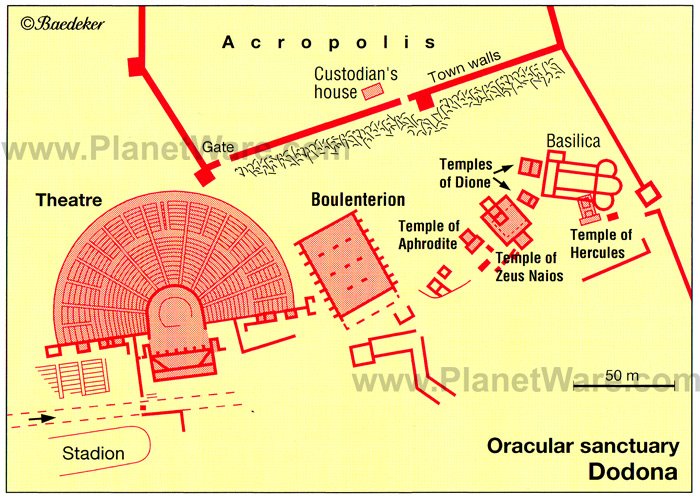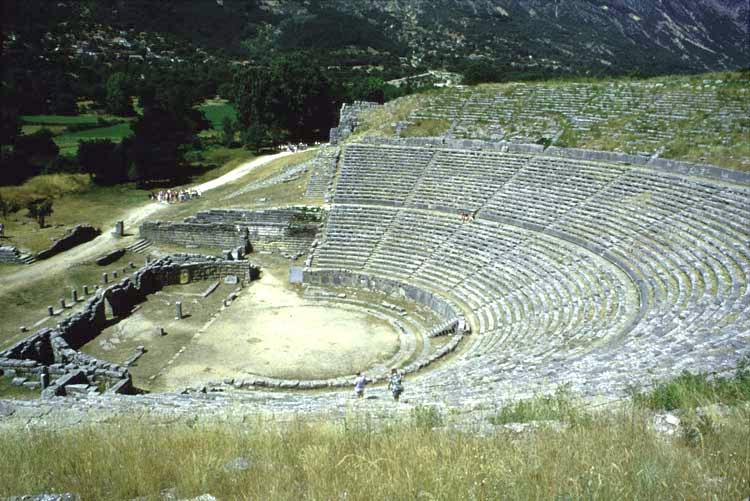Written in the 4th century BC Aristotle's Poetics is perhaps the earliest surviving work of dramatic theory. His book give us an insightful account of the theory of Greek tragedy. It seeks to explain how the elements of plot, character and spectacle all combine to produce feelings of shame and fear in us, and yet paradoxically pleasure (kalon) seems to derive from this apparently painful process. It presents the essential concepts of mimesis ('imitation'), hamartia ('fault') and catharsis ('purification'), all of which have been of serious concern to the theatre and dramtists ever since. It looks at why mythological heroes, although idealized figures of imagination, are still true to reality, all of which Aeschylus, Sophocles and Euripides brought to life on the stage. He explains how the best and most effective plays are ones based on complication and resolution, recognition ('anagnorisis') and reversal.
Chapter 6 contains Aristotle's famous definition of Tragedy:
Tragedy is a literary imitation of a sequence of actions, a sequence that is serious, complete in itself, and large in scope; its language is rendered pleasant sometimes by metrical means and sometimes by the addition of music; it is dramatic and not narrative; and by pity and fear brings about a katharsis of those emotions.
In this chapter Aristotle lists the components of Tragedy: plot, characterisation, diction, sentiment and arguments expressed in the dialogue, visual effects and music. Emphatically Aristotle says that the most important of these is plot.
Essentially Aristotle was a self-taught observational biologist. He saw living things evolving in an organic sense, not in a Darwinian sense that we might understand today, but as how embryos grow and develop from an undifferentiated form, later called the Science of Epigenesis In this sense Aristotle saw the world and things in it as a biological universe This type of thinking pervades all of his philosophy.
Aristotle (Stanford Encyclopedia of Philosophy) |
| Aristotle's Dionysian Matrix - Eric Csapo |
Ancient Greek authors, Aristotle - Archive.org
Aristotle (384-322 BCE) - The Embryo Project Encyclopedia
Archived
Philosophy of Theater (Stanford Encyclopedia of Philosophy)
Aristotle’s Poetics Study Guide - GradeSaver
https://bit.ly/2VUtl2K
https://bit.ly/2VUtl2K
Allan Gotthelf; James G. Lennox (22 October 1987). Philosophical Issues in Aristotle's Biology. Balme, David M. - The Place of Biology in Aristotle's Philosophy: Cambridge University Press. pp. 9–. ISBN 978-0-521-31091-8.
Essays on Aristotle's Poetics - Internet Archive
The Poetics of Aristotle: translation and commentary by Stephen Halliwell - Internet Archive
Essays on Aristotle's Poetics - Internet Archive
The Poetics of Aristotle: translation and commentary by Stephen Halliwell - Internet Archive
Gerald Frank Else (1957). Aristotle's poetics: the argument... Brill Archive.
Poetics (Oxford World's Classics)
Aristotle; trans. Buckley (1857). Treatise on Rhetoric: Literally Translated from the Greek. Aristotle's Poetics Bohn. pp. 405–.
Classical literary criticism : Dorsch, T. S., ed. and tr - Internet Archive
Aristotle; trans. Buckley (1857). Treatise on Rhetoric: Literally Translated from the Greek. Aristotle's Poetics Bohn. pp. 405–.
Classical literary criticism : Dorsch, T. S., ed. and tr - Internet Archive
S.H. Butcher Translation
On the art of poetry : with a supplement on music : Aristotle - Internet Archive
On the art of poetry : with a supplement on music : Aristotle - Internet Archive
Stephen Halliwell; Aristotle (December 1998). Aristotle's Poetics. University of Chicago Press. ISBN 978-0-226-31394-8.
Gerald Frank Else (1957). Aristotle's poetics: the argument... Brill Archive.
Aristotle; Gerald Frank Else (1970). Poetics. University of Michigan Press. pp. 1–. ISBN 0-472-06166-6.
KIRBY, J. T. (1991). ARISTOTLE’S “POETICS”: THE RHETORICAL PRINCIPLE. Arethusa, 24(2), 197–217. http://www.jstor.org/stable/26309403
Malcolm Heath (1 January 1987). The Poetics of Greek Tragedy. Stanford University Press. pp. 1–. ISBN 978-0-8047-1398-6.
Aristotle; Longinus; Stephen Halliwell; Demetrius, Donald Andrew Russell, Doreen Innes. Aristotle. Harvard University Press. ISBN 978-0-674-99563-5.
Aristotle in 23 Volumes, Vol. 23, translated by W.H. Fyfe (1932).
Aristotle, Poetics, Perseus Project section 1447a
BBC Radio 4 In Our Time with Melvyn Bragg
Aristotle's Poetics
BBC Radio 4 - In Our Time, The Greek Myths
Aristotle (2006). Poetics. ISBN 978-81-317-0689-3.
Who "Invented" Comedy? The Ancient Candidates for the Origins of Comedy and the Visual EvidenceBBC Radio 4 In Our Time with Melvyn Bragg
Aristotle's Poetics
BBC Radio 4 - In Our Time, The Greek Myths
Aristotle (2006). Poetics. ISBN 978-81-317-0689-3.
Aristotle- Poetics [Internet Encyclopedia of Philosophy]
Aristotle (1999). Poetics. Nick Hern Books. pp. 1–. ISBN 978-1-85459-333-7.
Aristotle (1999). Poetics. Nick Hern Books. pp. 1–. ISBN 978-1-85459-333-7.
Aristotle's Rhetoric (Stanford Encyclopedia of Philosophy)
The Sophists: Rhetoric, Democracy, and Plato's idea of sophistry: Barrett, Harold - Internet Archive
The Sophists: Rhetoric, Democracy, and Plato's idea of sophistry: Barrett, Harold - Internet Archive
Aristotle- Poetics [Internet Encyclopedia of Philosophy]
Peri poietikes. On the art of poetry (Aristotle) Translation and Commentary by Ingram Bywater
Peri poietikes. On the art of poetry (Aristotle) Translation and Commentary by Ingram Bywater
Gunter Gebauer; Christoph Wulf (1995). Mimesis: Culture, Art, Society. University of California Press. pp. 53–. ISBN 978-0-520-08459-9.
Walter Watson (2012). The Lost Second Book of Aristotle's "Poetics". University of Chicago Press. ISBN 978-0-226-87508-8.
Walter Watson (2012). The Lost Second Book of Aristotle's "Poetics". University of Chicago Press. ISBN 978-0-226-87508-8.
Avicenna. Avicenna's Commentary on the Poetics of Aristotle: A Critical Study with an Annotated Translation of the Text. Brill Archive.. ISBN 90-04-03962-7.
Greek Tragedy (Penguin Classics) Imperial Library of Trantor
Preface to Poetics and Extracts from Poetics by Aristotle
The Poetics. Translated from Greek into English and from Arabic into Latin with a rev. text, introd., commentary, glossary and onomasticon: Aristotle - Internet Archive
Tractatus Coislinianus
Greek Tragedy (Penguin Classics) Imperial Library of Trantor
Preface to Poetics and Extracts from Poetics by Aristotle
The Poetics. Translated from Greek into English and from Arabic into Latin with a rev. text, introd., commentary, glossary and onomasticon: Aristotle - Internet Archive
Tractatus Coislinianus
Aristotle; Richard Janko (1987). Aristotle: Poetics: With the Tractatus Coislinianus, Reconstruction of Poetics II, and the Fragments of the On Poets Hackett Publishing. ISBN 0-87220-033-7.
Aristotle on comedy: towards a reconstruction of Poetics II: Janko, Richard - Internet Archive
Omert J. Schrier (1998). The Poetics of Aristotle and the Tractatus Coislinianus: A Bibliography from About 900 Till 1996. BRILL.ISBN 90-04-11132-8.
Aristotle on comedy: towards a reconstruction of Poetics II: Janko, Richard - Internet Archive
Omert J. Schrier (1998). The Poetics of Aristotle and the Tractatus Coislinianus: A Bibliography from About 900 Till 1996. BRILL.ISBN 90-04-11132-8.
Jeffrey Rusten
The American Journal of Philology, Vol. 127, No. 1 (Spring, 2006), pp. 37-66
Rosenstein, Leon. “On Aristotle and Thought in the Drama.” Critical Inquiry, vol. 3, no. 3, 1977, pp. 543–565. JSTOR, www.jstor.org/stable/1342939.
WISE, JENNIFER. “TRAGEDY AS ‘AN AUGURY OF A HAPPY LIFE.’” Arethusa, vol. 41, no. 3, 2008, pp. 381–410. JSTOR, www.jstor.org/stable/44578286.
HANINK, JOHANNA. “ARISTOTLE AND THE TRAGIC THEATER IN THE FOURTH CENTURY B.C.: A RESPONSE TO JENNIFER WISE.” Arethusa, vol. 44, no. 3, 2011, pp. 311–328. JSTOR, www.jstor.org/stable/44578369.
Aristotle, Poetics, section 1449a
Aristotle, Poetics, section 1449b
Aristotle Poetics 1447a - 1455a : TextCritical.Net
Search results - Persée for "Simon Byl"



